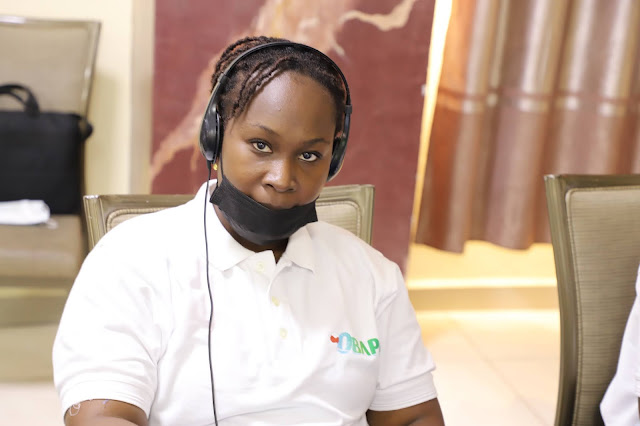"I am leaving the OBAPAO workshop as a different person", Mrs Ebunoluwa Ajagun
Participants in the 5-day capacity building workshop for National Focal Points of the Observatory for Biodiversity and Protected Areas of West Africa (OBAPAO) was a successful event. The participants were drawn from the 16 West African countries members of the West African Economic and Monetary Union (WAEMU) or the Economic Community of West African States (ECOWAS).
Stating her view on the workshop, the representative of the Federal Ministry of Environment of Nigeria, Mrs Ebunoluwa Ajagun, said: "The goal and the objectives of the workshop were well achieved. I am leaving as a different person, in that I have gained more knowledge on OBAPAO and will definitely go back and share the knowledge and strive to make all the necessary corrections to the World Database on Protected Areas (WPDA) data for Nigeria."
Stating her view on the workshop, the representative of the Federal Ministry of Environment of Nigeria, Mrs Ebunoluwa Ajagun, said: "The goal and the objectives of the workshop were well achieved. I am leaving as a different person, in that I have gained more knowledge on OBAPAO and will definitely go back and share the knowledge and strive to make all the necessary corrections to the World Database on Protected Areas (WPDA) data for Nigeria."
The purpose of the OBAPAO National Focal Points capacity building workshop held in Accra, from the 24th to 28th May 2021, was to promote stakeholders' engagement with reference information systems and other existing database tools for biodiversity and protected area management in the West African region. The Regional Reference Information System (RRIS) functions as the main observatory for data and information repository, to analyse and share information on biodiversity and protected areas. The workshop brought together more than 50 trainers, trainees and IMET coaches with expertise in biodiversity and protected areas at international and national levels.
According to Mr Hamissou Halilou Malam Garba, a participant from Niger, "Previously there were several tools for assessing the effectiveness of protected areas, but in recent years with the introduction of the IMET through BIOPAMA, the assessment is much more comprehensive, as this tool focuses on the main aspects of protected area management, as well as the actors and partners involved in management. This tool synchronises the main salient points of the previous tools we were used to."
The OBAPAO is an initiative of the African, Caribbean and Pacific States (ACP), funded by the 11th European Union Development Fund and implemented jointly by the International Union for the Conservation of Nature (IUCN) and the Joint Research Centre of the European Commission (JRC-EC). It is a project run under the Biodiversity and Protected Areas Management Program (BIOPAMA), which strives to improve the long-term conservation and sustainable use of natural resources in African, Caribbean, and Pacific (ACP) countries areas and surrounding communities. Building on the first five years of activities funded by the 10th European Development Fund, the second phase of BIOPAMA provides tools for data and information management, services for improving knowledge as well as the capacity for protected areas planning and decision making, and funding opportunities for specific local actions.
The OBAPAO consortium comprises the Centre de Suivi Ecologique (CSE), the lead; the Réseau des Aires Marines Protégées d'Afrique de l'Ouest (RAMPAO), the Regional Marine Centre of the University of Ghana and the AGRYHMET Centre. The overall objective of the observatory is to: "improve biodiversity conservation in West Africa on a long-term basis, by promoting the use of the best scientific knowledge and data, and by building capacity to support policy and decision making on issues related to biodiversity conservation and sustainable management of protected areas."
 |
| Group Picture, Opening Ceremony |





Comments
Post a Comment